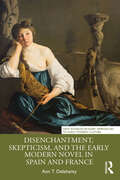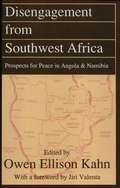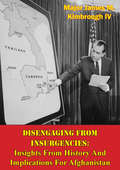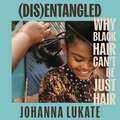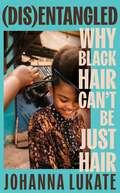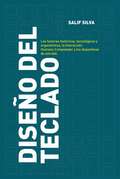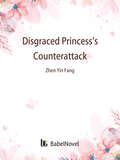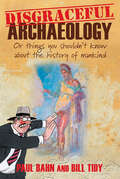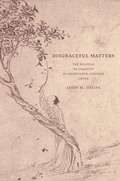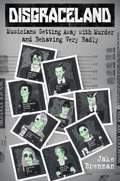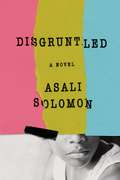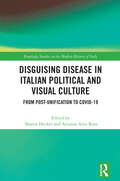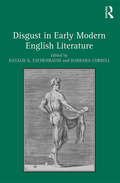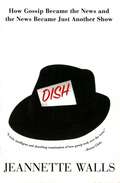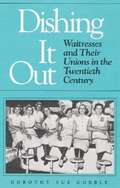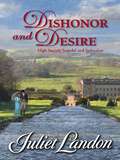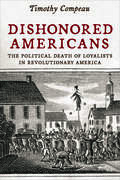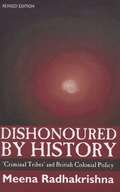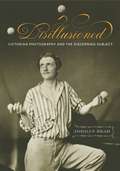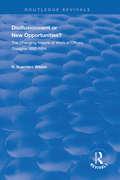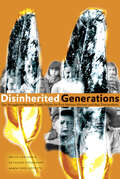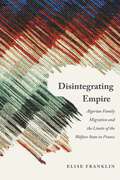- Table View
- List View
Disenchantment, Skepticism, and the Early Modern Novel in Spain and France (New Interdisciplinary Approaches to Early Modern Culture)
by Ann T. DelehantyThis volume examines five early modern novels from the seventeenth century in Spain and France as examples of literature as a form of skeptical inquiry: Cervantes’s Don Quijote, Zayas’s Desengaños amorosos, Scarron’s Roman comique, Cyrano de Bergerac’s L’Autre Monde, and Mme. de Lafayette’s Zayde. These early modern novels encourage readers to take a critical stance toward accepted beliefs, through content that stages multiple encounters with the shockingly unfamiliar as well as through experiments in literary form, especially the interpolated story. At its broadest reach, this study asserts the fundamental value of literature as a means of encouraging discernment, recognizing the illusory, and honing critical acuity. In terms of the particularity of the historical moment, the volume also identifies the early modern novel as uniquely able to represent the conflicting value spheres of early modernity because of its ability to present multiple voices and its fascination with conflicting vantage points. Due to its interdisciplinary nature, Disenchantment, Skepticism, and the Early Modern Novel in Spain and France appeals to literary scholars and intellectual historians of the early modern period in Europe, as well as to advanced undergraduates and postgraduates studying the early novel, intellectual history, and philosophy of literature.
Disengagement From Southwest Africa: Prospects For Peace In Angola And Namibia (The East-South Relations Series)
by Owen Kahn Jiri ValentaGorbachev's new thinking on superpower relations assumes that struggle between two opposing world systems no longer characterizes the present era. This second volume in the East-South Relations series explores the implications of Gorbachev's new thinking for regional conflicts. Because these conflicts jeopardize tranquil relations between the United States and the Soviet Union, they are perceived as contrary to the new spirit of global cooperation. This volume suggests that the accords on Southwest Africa may illustrate how the superpowers will resolve conflict, and shows how smaller powers may now have new roles cast for them by the superpowers. In 1975, Soviet-Cuban assistance to the Leninist-oriented Movement for the Popular Liberation of Angola (MPLA) was the first extensive Soviet-allied military intervention in the Third World. While the Soviet-backed Cubans propped up the MPLA, the South Africans intervened, on a smaller scale, in support of the National Union for the Total Independence of Angola (UNITA) under Jonas Savimbi. After 1985 UNITA began receiving United States support, and a military stalemate ensued. The contributors to this volume analyse how the Soviet Union and the United States used this stalemate to move the MPLA, Cuba and South Africa to settle not only their differences, but also the vexing question of the Independence of Namibia. Central issues explored are how and why South Africa and Cuba got into the Angolan arena, why they stayed so long, and why they saw fit to get out. While the authors differ on the forces at work, their debate is itself enlightening, and offers valuable insights into the policy options of regional powers. The contributors also review further steps, beyond military disengagement, needed to finally resolve the Angolan civil war, and ensure regional stability. They assess the potential for breakdown of the accords, and the likely consequences should this occur. Disengagement from Southwest Africa will interest policymakers and researchers concerned with developments in southern Africa and Cuba, and with relations between the superpowers.
Disengaging From Insurgencies: Insights From History And Implications For Afghanistan
by Major James M. Kimbrough IVTo determine insights for future disengagements, this thesis examines four historical episodes in which Western nations withdrew from on-going conflicts against insurgent-like enemies.Relatively unsuccessful results flowed from the British withdrawal from Aden during the 1960's and the American withdrawal from Vietnam during 1972-1973. As the last British troop departed Aden, a state of turmoil prevailed. Not only could the insurgents realistically claim victory in evicting the British by force, but also the territory later became the Arab world's first Marxist state and a base for terrorists. America's departure from Vietnam produced similar disappointment.More successful outcomes occurred during the British withdrawal from Malaya in the 1960's and the American withdrawal from El Salvador in 1988-1989. After World War II, the British attempted to re-establish colonial control of Malaya and faced resistance from communist insurgents. In the midst of their counterinsurgency, the British government granted Malaya independence in August 1957. The Malayan government, backed by British support, continued its struggle against the communist insurgents for another three years. The Malayan government announced victory in 1960 and began to enjoy a relatively peaceful and prosperous aftermath. From kidnappings, assassinations, and other political-criminal activities, an insurgency emerged in El Salvador in 1979. As the movement transitioned to guerrilla warfare, the insurgent fighters rivaled the strength of the Salvadoran security forces. From 1980-1992, the government of the United States provided El Salvador extensive funding for social and political reforms, military material support, and training to counter the communist insurgents. These efforts, coupled with effective El Salvadoran governance, eventually led the communists to abandon their cause.
Disentangled: Why Black Hair Can't Be Just Hair
by Johanna LukateEven before we get to introduce ourselves by name, our hair has already started to tell stories about who we are, where we are from and where we are at. Our hair is tangled up in the interplay of race, gender, class, nationality, sexuality, power and beauty. It is an avid storyteller and a consummate performer - whether we like it or not. If our hair could talk, what stories would it tell about us?(Dis)entangled delves into the intricate and deeply personal relationship between Black individuals and their hair, exploring - through a collection of diverse experiences - the profound significance of hair as a conduit for self-expression, resilience, and collective memory within communities around the world. Each story illuminates the complex tapestry of experiences surrounding Black hair, shedding light on its intersections with gender, race and identity.Through the voices of those who have walked this textured path, the book ultimately seeks to empower readers to embrace their own unique journey of self-discovery, one strand at a time.
Disentangled: Why Black Hair Can't Be Just Hair
by Johanna LukateEven before we get to introduce ourselves by name, our hair has already started to tell stories about who we are, where we are from and where we are at. Our hair is tangled up in the interplay of race, gender, class, nationality, sexuality, power and beauty. It is an avid storyteller and a consummate performer - whether we like it or not. If our hair could talk, what stories would it tell about us?(Dis)entangled delves into the intricate and deeply personal relationship between Black individuals and their hair, exploring - through a collection of diverse experiences - the profound significance of hair as a conduit for self-expression, resilience, and collective memory within communities around the world. Each story illuminates the complex tapestry of experiences surrounding Black hair, shedding light on its intersections with gender, race and identity.Through the voices of those who have walked this textured path, the book ultimately seeks to empower readers to embrace their own unique journey of self-discovery, one strand at a time.
Disentangled: Why Black Hair Can't Be Just Hair
by Johanna LukateEven before we get to introduce ourselves by name, our hair has already started to tell stories about who we are, where we are from and where we are at. Our hair is tangled up in the interplay of race, gender, class, nationality, sexuality, power and beauty. It is an avid storyteller and a consummate performer - whether we like it or not. If our hair could talk, what stories would it tell about us?(Dis)entangled delves into the intricate and deeply personal relationship between Black individuals and their hair, exploring - through a collection of diverse experiences - the profound significance of hair as a conduit for self-expression, resilience, and collective memory within communities around the world. Each story illuminates the complex tapestry of experiences surrounding Black hair, shedding light on its intersections with gender, race and identity.Through the voices of those who have walked this textured path, the book ultimately seeks to empower readers to embrace their own unique journey of self-discovery, one strand at a time.
Diseño del Teclado: Los factores históricos, tecnológicos y ergonómicos, la Interacción Humano-Computador y los dispositivos de entrada.
by Salif SilvaLo que proponemos en las páginas de este libro es una serie de ideas que pretenden aclarar el debate actual sobre el teclado, por medio de observaciones documentadas, sedimentando las bases para investigaciones futuras. El objeto de estudio de esta publicación es, por lo tanto, el teclado de ordenador en su aspecto esencial, desde la invención de la máquina de escribir, en 1868, hasta la actualidad. Por lo tanto, pretendemos reflexionar sobre su naturaleza, valorando los aspectos históricos, tecnológicos, estéticos y ergonómicos, a través de un levantamiento de los datos en los más diversos dominios ligados al teclado. Por lo tanto, esperamos permitir el reconocimiento de la realidad de los dispositivos de entrada de datos, y la perspectiva del desarrollo de conceptos innovadores y aplicaciones adaptadas a la realidad actual y futura.
Disgraceful Archaeology: Or Things You Shouldn't Know About the History of Mankind
by Paul Bahn Paul G. Bahn Bill TidyThe book that all archaeology buffs have secretly been yearning for! This unique blend of text, anecdote and cartoon reveals, and revels in, those aspects of the past that have been ignored, glossed over or even suppressed — the bawdy, the scatological and the downright bizarre. Our ancestors were not always serious, downtrodden and fearful creatures. They were human like ourselves and shared our earthy sense of humour that is based on bodily functions, bawdiness and slapstick. So it’s time to take the fig leaf off the past and have a long, hard look at the real past — the world that would have had the Victorians reaching for their smelling salts. So if you want to know what your average Egyptian slave thought of pharaoh, or a Roman legionary thought of his commander, you will find the answer in Disgraceful Archaeology — in hilarious graphic detail!
Disgraceland: Musicians Getting Away with Murder and Behaving Very Badly
by Jake BrennanFrom the creator of the popular rock 'n' roll true crime podcast, DISGRACELAND comes an off-kilter, hysterical, at times macabre book of stories from the highly entertaining underbelly of music history.You may know Jerry Lee Lewis married his thirteen-year-old cousin but did you know he shot his bass player in the chest with a shotgun or that a couple of his wives died under extremely mysterious circumstances? Or that Sam Cooke was shot dead in a seedy motel after barging into the manager's office naked to attack her? Maybe not. Would it change your view of him if you knew that, or would your love for his music triumph? Real rock stars do truly insane thing and invite truly insane things to happen to them; murder, drug trafficking, rape, cannibalism and the occult. We allow this behavior. We are complicit because a rock star behaving badly is what's expected. It's baked into the cake. Deep down, way down, past all of our self-righteous notions of justice and right and wrong, when it comes down to it, we want our rock stars to be bad. We know the music industry is full of demons, ones that drove Elvis Presley, Phil Spector, Sid Vicious and that consumed the Norwegian Black Metal scene. We want to believe in the myths because they're so damn entertaining.DISGRACELAND is a collection of the best of these stories about some of the music world's most beloved stars and their crimes. It will mix all-new, untold stories with expanded stories from the first two seasons of the Disgraceland podcast. Using figures we already recognize, DISGRACELAND shines a light into the dark corners of their fame revealing the fine line that separates heroes and villains as well as the danger Americans seek out in their news cycles, tabloids, reality shows and soap operas. At the center of this collection of stories is the ever-fascinating music industry--a glittery stage populated by gangsters, drug dealers, pimps, groupies with violence, scandal and pure unadulterated rock 'n' roll entertainment.
Disgruntled: A Novel
by Asali SolomonAn elegant, vibrant, startling coming-of-age novel for anyone who has ever felt the shame of being alive<P><P> Kenya Curtis is only eight years old, but she knows that she's different, even if she can't put her finger on how or why. It's not because she's black - most of the other students in the fourth-grade class at her West Philadelphia elementary school are, too. Maybe it's because she celebrates Kwanzaa, or because she's forbidden from reciting the Pledge of Allegiance. Maybe it's because she call her father -a housepainter-slash-philosopher - "Baba" instead of "Daddy," or because her parents' friends gather to pour out libations "from the Creator, for the martyrs" and discuss "the community."<P> Disgruntled, effortlessly funny and achingly poignant, follows Kenya from West Philadelphia to the suburbs, from public school to private, and from childhood through adolescence, as she grows increasingly disgruntled by her inability to find any place or thing or person that feels like home.<P> A coming-of-age tale, a portrait of Philadelphia in the late eighties and early nineties, and an examination of the impossible double-binds of race, Disgruntled by Asali Solomon is a novel about the desire to rise above the limitations of the narratives we're given and the painful struggle to craft fresh ones we can call our own.
Disguising Disease in Italian Political and Visual Culture: From Post-Unification to COVID-19 (Routledge Studies in the Modern History of Italy)
by Sharon Hecker Arianna Arisi RotaAlthough considered an isolated event, the Italian government’s initial resistant response to COVID-19 has deep historical roots. This is the first interdisciplinary book to critically examine the ongoing phenomenon of disguising contagious disease in Italy from Unification to the present.The book explores how governments, public opinion, social entities and cultural production have avoided or sublimated contagion during cholera, typhoid, syphilis, malaria, HIV and COVID-19 to impose narratives of the nation’s healthy body in Italy and its colonies. Examples range from a tuberculosis sanatorium in Capri that masked as a luxury hotel and hideaway for queer couples to an obscure but talented professor who found a new cure for syphilis; from denial of disease in governmental actions to sublimated representations in Italian art, literature and films such as Luchino Visconti’s cinematic adaptation of Thomas Mann’s Death in Venice to a sociological study of the need to include fragile figures based on the lessons of COVID-19.Intended for scholars, students and general readers interested in the history of medicine, political and cultural history, and Italian studies, this volume shows how contagious diseases clash with the official narrative of emerging modernized urban settings and challenge the desire for political and economic stability.
Disgust in Early Modern English Literature
by Natalie K. Eschenbaum Barbara CorrellWhat is the role of disgust or revulsion in early modern English literature? How did early modern English subjects experience revulsion and how did writers represent it in poetry, plays, and prose? What does it mean when literature instructs, delights, and disgusts? This collection of essays looks at the treatment of disgust in texts by Spenser, Shakespeare, Donne, Jonson, Herrick, and others to demonstrate how disgust, perhaps more than other affects, gives us a more complex understanding of early modern culture. Dealing with descriptions of coagulated eye drainage, stinky leeks, and blood-filled fleas, among other sensational things, the essays focus on three kinds of disgusting encounters: sexual, cultural, and textual. Early modern English writers used disgust to explore sexual mores, describe encounters with foreign cultures, and manipulate their readers' responses. The essays in this collection show how writers deployed disgust to draw, and sometimes to upset, the boundaries that had previously defined acceptable and unacceptable behaviors, people, and literatures. Together they present the compelling argument that a critical understanding of early modern cultural perspectives requires careful attention to disgust.
Dish: How Gossip Became the News and the News Became Just Another Show
by Jeannette Walls“Provocative and invariably entertaining” a #1 New York Times bestselling author “gives dishing the dirt its historical, social and political due” (Publishers Weekly).From #1 New York Times bestselling author of The Glass Castle, now a major motion picture, comes an incisive study of our obsession with gossip.Gossip. It’s more than just hearsay, society columns, and supermarket tabloids. It has, like it or not, become a mainstay of American pop culture. In Dish, industry insider Jeannette Walls gives this intriguing subject its due, offering a comprehensive, serious exploration of gossip and its social, historical, and political significance. Examining the topic from the inside out, Walls looks at the players; the origins of gossip, from birth of People magazine to the death of Lady Di; and how technology including the Internet will continue to change the face of gossip. As compelling and seductive as its subject matter, Dish brilliantly reveals the fascinating inner workings of a phenomenon that is definitely here to stay.“A history of how gossip became the news . . . Saucy, sassy . . .” —Los Angeles Times“Truly intelligent and absorbing.” —The Boston Sunday Globe“Dish is a mouthful.” —San Antonio Express News“A serious and accurate history of a persistent part of media coverage.” —St. Louis Post-Dispatch“Extraordinary.” —Don Imus“Hard to put down . . . Dish is irresistible.” —US Weekly“It’s an old-fashioned sideshow, high-spirited, mean-spirited, and plenty of guilty fun.” —Kirkus Reviews“Strewn with delicious tidbits.” —Entertainment WeeklyWell-researched and intelligent.” —New York Daily News“Both an entertaining insider’s look and a solid history of gossip.” —Library Journal“A fascinating, dishy story.” —Booklist
Dishing It Out: Waitresses and Their Unions in the Twentieth Century
by Dorothy Sue CobbleAn invaluable history book about a large segment of the twentieth century workforce--waitresses.
Dishonor and Desire
by Juliet LandonA reluctant bride finds that marriage can set one free in surprising ways in this delightful Regency romance.Having run from two previous engagements, Caterina Chester knows that marriage cannot be avoided for much longer. But to be parceled off as part of a wager to clear her family’s debts? Sold to society’s most disreputable rake? Caterina is outraged at the proposal.Yet Sir Chase Boston, for all his impeccable manners and charm, reveals an undeniably exhilarating wild streak that taunts and teases her. She has kept her passionate nature tightly confined. Now it seems that this most improper husband may be the only man who can free her!
Dishonorable Passions: Sodomy Laws in America, 1861-2003
by William N. EskridgeA fascinating one-of-a-kind history of the government's regulation of sexual behavior <P> From the Pentagon to the wedding chapel, there are few issues more controversial today than gay rights. As William Eskridge persuasively demonstrates in Dishonorable Passions, there is nothing new about this political and legal obsession. The American colonies and the early states prohibited sodomy as the "crime against nature," but rarely punished such conduct if it took place behind closed doors. By the twentieth century, America's emerging regulatory state targeted "degenerates" and (later) "homosexuals." The witch hunts of the McCarthy era caught very few Communists but ruined the lives of thousands of homosexuals. The nation's sexual revolution of the 1960s fueled a social movement of people seeking repeal of sodomy laws, but it was not until the Supreme Court's decision in Lawrence v. Texas (2003) that private sex between consenting adults was decriminalized. With dramatic stories of both the hunted (Walt Whitman and Margaret Mead) and the hunters (Earl Warren and J. Edgar Hoover), Dishonorable Passions reveals how American sodomy laws affected the lives of both homosexual and heterosexual Americans. Certain to provoke heated debate, Dishonorable Passions is a must-read for anyone interested in the history of sexuality and its regulation in the United States.
Dishonored Americans: The Political Death of Loyalists in Revolutionary America (The Revolutionary Age)
by Timothy CompeauWith the final words of the Declaration of Independence, the signatories famously pledged to one another their lives, their fortunes, and their "sacred Honor." But what about those who made the opposite choice? By looking through the analytical lens of honor culture, Dishonored Americans offers an innovative assessment of the experience of Americans who made the fateful decision to remain loyal to the British Crown during and after the Revolution.Loyalists, as Timothy Compeau explains, suffered a "political death" at the hands of American Patriots. A term drawn from eighteenth-century sources, ‘political death’ encompassed the legal punishments and ritualized dishonors Patriots used to defeat Loyalist public figures and discredit their counter-revolutionary vision for America. By highlighting this dynamic, Compeau makes a significant intervention in the long-standing debate over the social and cultural factors that motivated colonial Americans to choose sides in the conflict, narrating in compelling detail the severe consequences for once-respected gentlemen who were stripped of their rights, privileges, and power in Revolutionary America.
Dishonoured by History: 'Criminal Tribes' and British Colonial Policy
by Meena RadhakrishnaThis book explores how colonial policies converted itinerant groups on the one hand into a source of cheap labor and on the other into a category known as 'criminal tribes'. It also examines missionary activity, especially the Salvation Army.
Disillusioned: Victorian Photography and the Discerning Subject
by Jordan BearHow do photographs compel belief and endow knowledge? To understand the impact of photography in a given era, we must study the adjacent forms of visual persuasion with which photographs compete and collaborate. In photography’s early days, magic shows, scientific demonstrations, and philosophical games repeatedly put the visual credulity of the modern public to the test in ways that shaped, and were shaped by, the reality claims of photography. These venues invited viewers to judge the reliability of their own visual experiences. Photography resided at the center of a constellation of places and practices in which the task of visual discernment—of telling the real from the constructed—became an increasingly crucial element of one’s location in cultural, political, and social relations. In Disillusioned: Victorian Photography and the Discerning Subject, Jordan Bear tells the story of how photographic trickery in the 1850s and 1860s participated in the fashioning of the modern subject. By locating specific mechanisms of photographic deception employed by the leading mid-century photographers within this capacious culture of discernment, Disillusioned integrates some of the most striking—and puzzling—images of the Victorian period into a new and expansive interpretive framework.
Disillusioned: Victorian Photography and the Discerning Subject (G - Reference,information And Interdisciplinary Subjects Ser.)
by Jordan BearHow do photographs compel belief and endow knowledge? To understand the impact of photography in a given era, we must study the adjacent forms of visual persuasion with which photographs compete and collaborate. In photography’s early days, magic shows, scientific demonstrations, and philosophical games repeatedly put the visual credulity of the modern public to the test in ways that shaped, and were shaped by, the reality claims of photography. These venues invited viewers to judge the reliability of their own visual experiences. Photography resided at the center of a constellation of places and practices in which the task of visual discernment—of telling the real from the constructed—became an increasingly crucial element of one’s location in cultural, political, and social relations. In Disillusioned: Victorian Photography and the Discerning Subject, Jordan Bear tells the story of how photographic trickery in the 1850s and 1860s participated in the fashioning of the modern subject. By locating specific mechanisms of photographic deception employed by the leading mid-century photographers within this capacious culture of discernment, Disillusioned integrates some of the most striking—and puzzling—images of the Victorian period into a new and expansive interpretive framework.
Disillusionment or New Opportunities?: The Changing Nature of Work in Offices, Glasgow 1880–1914 (Routledge Revivals #Vol. 10)
by R. Guerriero WilsonFirst published in 1998, this book explores the physical and technological changes which occurred in the growing bureaucracies of big-business and of government as well as in the small and mid-size business of the city. The study of these changes provides a context within which to set the complementary experiences of the men and women who chose to seek a living in the wide array of constantly changing office jobs.
Disinherited Generations: Our Struggle to Reclaim Treaty Rights for First Nations Women and their Descendants
by Nellie Carlson Kathleen SteinhauerTwo Cree women tell the story of how they took on the Canadian government and helped change the lives of thousands. This oral autobiography of two remarkable Cree women tells their life stories against a backdrop of government discrimination, First Nations activism, and the resurgence of First Nations communities. Nellie Carlson and Kathleen Steinhauer, who helped to organize the Indian Rights for Indian Women movement in western Canada in the 1960s, fought the Canadian government&’s interpretation of treaty and Aboriginal rights, the Indian Act, and the male power structure in their own communities in pursuit of equal rights for Aboriginal women and children. After decades of activism and court battles, First Nations women succeeded in changing these oppressive regulations, thus benefitting thousands of their descendants. Those interested in human rights, activism, history, and Native Studies will find that these personal stories, enriched by detailed notes and photographs, form a passionate record of an important, continuing struggle.
Disintegrating Empire: Algerian Family Migration and the Limits of the Welfare State in France (France Overseas: Studies in Empire and Decolonization)
by Elise FranklinDisintegrating Empire examines the entangled histories of three threads of decolonization: the French welfare state, family migration from Algeria, and the French social workers who mediated between the state and their Algerian clients. After World War II, social work teams, midlevel bureaucrats, and government ministries stitched specialized social services for Algerians into the structure of the midcentury welfare state. Once the Algerian Revolution began in 1954, many successive administrations and eventually two independent states—France and Algeria—continuously tailored welfare to support social aid services for Algerian families migrating across the Mediterranean.Disintegrating Empire reveals the belated collapse of specialized services more than a decade after Algerian independence. The welfare state&’s story, Elise Franklin argues, was not one merely of rise and fall but of winnowing services to &“deserving&” clients. Defunding social services—long associated with the neoliberal turn in the 1980s and beyond—has a much longer history defined by exacting controls on colonial citizens and migrants of newly independent countries. Disintegrating Empire explores the dynamic, conflicting, and often messy nature of these relationships, which show how Algerian family migration prompted by decolonization ultimately exposed the limits of the French welfare state.
